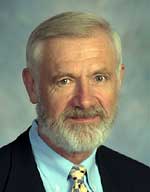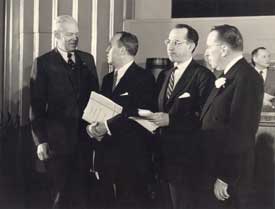
This web page is part of the Michigan Today Archive. To see this story in its original context, click here.
University awards Thomas Francis, Jr. Medal
By Nancy Connell |
 |
| Foege (Photo courtesy Emory University) |
During a distinguished career, Foege was director of the Centers for Disease Control and Prevention (CDC), former executive director of the Carter Center and senior advisor to the Bill and Melinda Gates Foundation.
The medal will be awarded April 12 during a celebration to mark the 50th anniversary of the watershed announcement by Francis that the Salk polio vaccine had been proven effective. The event will be held in Rackham Auditorium, site of the original pronouncement. A keynote address by Foege, an historical retrospective about polio and discussions of global public health today will comprise the program. The ceremony begins at 9:30 a.m. and is open to the public.
Francis made the dramatic announcement the morning of April 12, 1955, that the polio vaccine had been found "safe, effective and potent." He designed and led a $17.5 million nationwide field trial of unprecedented scope to test the vaccine. The study involved 1.8 million children from the United States, Canada and Finland. Workers at the U-M Survey Research Center handled the mountains of data on 1.8 million computer punch cards. The vaccine was developed by Dr. Jonas Salk, who earlier had studied under Francis, and Salk's team of researchers at the University of Pittsburgh.
 |
| Former U-M President Harlan Hatcher, left, speaks with Drs. Thomas Francis, Jonas Salk and Basil O'Connor at the 1955 Rackham Auditorium announcement that field trials had proven the Salk vaccine effective. (Photo courtesy Bentley Historical Library) |
Francis was the founder and chairman of the epidemiology department in the School of Public Health (SPH) and one of the most respected medical and research figures of his generation.
"The Thomas Francis, Jr. Medal symbolizes the University's commitment to global public health and its pride in the role Dr. Francis played in ending the polio epidemic in the U.S.," President Mary Sue Coleman says. "William Foege, like Thomas Francis, is a hero in the field of public health. He embodies the dedication, record of achievement and humanitarian qualities the medal was created to honor.
"The University of Michigan has created the Thomas Francis, Jr. Medal to support sustained efforts to combat vaccine-preventable disease and to call public attention to the needs that still exist," Coleman says. Funding for the medal has been provided by private gifts.
"In terms of lives saved and people freed from disease, Foege has changed the world as we know it," says Noreen Clark, SPH dean. "He exemplifies the principles that are at the core of public health."
 |
| Children such as these contributed to the success of polio vaccine trials. (Photo courtesy Bentley Historical Library) |
Foege is an epidemiologist who became chief of the U.S. CDC Smallpox Eradication Program in the 1970s. From 1977-1983 he served as director of the CDC, and from 1984-2000 was executive director of the Task Force for Child Survival and Development—an organization he founded. The task force raised general immunization levels of the world's children from 20 percent to 80 percent in just six years. He also was affiliated with the Carter Center, where he served as executive director, a fellow for health policy and executive director of Global 2000.
Foege became Presidential Distinguished Professor of International Health in the Rollins School of Public Health at Emory University in 1997. He was awarded the Mary Woodard Lasker Award for Public Service in Support of Medical Research and Health Sciences, "America's Nobel," in 2001.
Foege became a senior advisor to the Bill and Melinda Gates Foundation in 1999 and now serves as a fellow at the foundation. To honor his lifetime of achievement, the foundation made a gift of $5 million in 2004 to endow the Foege Fellowship in Public Health at Emory University.
As a medical missionary in Nigeria in 1966, Foege faced a fast-moving outbreak of smallpox without enough vaccine to protect the population in the traditional manner of inoculating as many members of a population as one can reach. Instead, he and his colleagues invented a new approach that modeled the most likely routes of transmission by geography, travel patterns and familial relationships and then contained the outbreak by focusing the limited amount of vaccine on just three "hot spots."
During a smallpox outbreak in India in 1973, Foege, then chief of the CDC's Smallpox Eradication Program, again proved that targeted containment vaccination worked better than mass vaccination.
"In a year, India went from a country with the highest rate of smallpox to zero cases," Foege recalls. Since then, his approach has become the standard of care for controlling outbreaks of emerging disease. In 1979, the World Health Organization declared smallpox eradicated.
Foege received his medical degree from the University of Washington Medical School in 1961 and his master of public health degree from Harvard University in 1965.
For more information, visit http://www.polio.umich.edu.
|
Michigan Today News-e is a monthly electronic publication for alumni and friends. |
| MToday NewsE | |
|
|
Michigan Today
online alumni magazine
University Record
faculty & staff newspaper
MGoBlue
athletics
News Service
U-M news
Photo Services
U-M photography
University of Michigan
gateway
